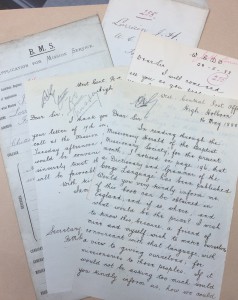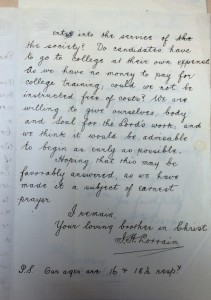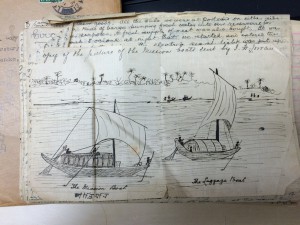Hidden treasures, part 5. In which I realise that this diary is written by Herbert J Lorrain and was sent to his mother as a gift
Posted Friday, 25th September 2015
First of all, today’s excerpt for your enjoyment:
“On Monday morning we are up betimes, soon after sunrise we pass by the piles of the new bridge which is to bring the train across the river & so on to Silchar. There are numbers of cooleys at work, but very soon the rains will swell the river & the whole will be under water until next autumn. It may easily be understood that work of this kind is slow & that years perhaps will elapse ere the steam engine is seen bearing its freight of passengers & goods into Silchar. By six o’clock we have reach the mouth of the river which has borne us upon its bosom from the heart of the Lushai Hills & now we turn our heads upstream on the wider river Barak. The boatmen no longer sit at ease & merely guide the crafts, but are on the shore tugging at the towing lines. K’s deserted boat & our own are lashed together & one man guides the two while the remaining 2 men tow us along. The cook boat is not far behind & we can see our boy Khuma sitting outside & trying to take in the big river at a glance, & surveying with wonder the vast expanse of flat country on either side. A crowd of ugly vultures, 26 in number, quarrelling over the carcass of a cow as it floats down with the stream, is of great interest to him, for these repulsive looking creatures are unknown in his native hills. Just before breakfast time we spy a number of men pulling a drag net to shore, so we go across the river to them & watch them as they labour at the heavy ropes. A large area of the river has been enclosed by a net some quarter of a mile in length, & now, men are standing at either end slowly & laboriously & with many a shout & grunt pulling the net ashore, every minute lessening the area enclosed & consequently crowding the fish closer & closer together. We watch for a quarter of an hour & by that time the men at wither end of the net who were originally standing about 100 yards apart have gradually moved along the shore & now are close together, the net is almost all drawn in, when two or three men jump in the water to keep the fish from escaping when it is finally drawn ashore; the whole surface of the water inside the net is one mass of struggling fish & one huge monster nearly succeeds in bounding over the net, but is quickly knocked back again by the alert fishermen. At last the word is given & with infinite care & rapidity the whole finny company is hoisted on to the beach, kicking & jumping in the bright sunlight to the infinite delight of our Lushai lad. We leave the servants to wrangle with the fisherman & take a short walk getting on the boat when we hear that the fish are fried & ready. So passes the day, quietly and uneventfully, until at last the puffing of the Silchar steamer is heard behind us & our boy is all alive to see the wonderful “Fire Boat” of which he has heard so much. His dreams however seem to have exceeded the reality, for when the great ugly, soot-begrimed stern-wheeler goes grunting by upstream he remarks how very slowly it travels & seems to be somewhat disappointed. But the lumbering old boat pays us out for our disrespect by giving us a good shake up after she has passed & nearly driving us upon a rock. Next day at noon, Silchar comes in sight, with its long row of “go downs” and imposing crowd of country boats, steamers & barges. Slowly we pass them by on our way to the landing, which at last we reach, &climb the rude steps cut in the steep bank & stand once more in a place which can boast of a certain amount of civilization & which we in the wilds of Lushai-land amuse ourselves by dubbing “The Metropolis”. K’s servant is on the bank to meet us & informs us that K. is rounds at the “Hotel”. (please note this word). We accordingly make for that imposing edifice (which by the way is nothing more than a thatched bungalow), & greet our friend once more. We next go in search of our old friend & fellow missionary Dr. J. & find him in a new house close by, with his wife & little son. We have arrived somewhat before the expected time, as we had wired from Jaluacherra that we should put in an appearance on the following day, but we did not think then that we should have made any progress on Sunday. However, a day earlier or later in India is of no consequence & we are soon made perfectly comfortable in a nice large bedroom, where everything speaks of the presence in the house of a lady. What a delightful rest it seems after the hot journey & how nice, when our boxes have arrived from the boat, to change our clothes & make ourselves look something like civilized beings. K. says that business matters will detain him here until next Monday, so we have several days to spend with our friend Dr. J. and his wife, & they are days of real pleasure. The bachelor life we live in our mountain home makes this happy home seem truly a little paradise, & our kind hostess does everything she can to make us feel that at any rate we can always reckon on having one Indian home, in whose charmed circle we shall be always welcome. The newly arrived son & heir is just able to sit up & make himself interesting & many an hour we spend fanning the poor little creature, who however seems to bear the extreme heat very well, which is more than we do. The change from the comparatively cool climate of Aijal to the tropical heat of Silchar is about as much as we can bear, but in a few days we find ourselves getting used to it, however we still wonder how we could have lived a whole year in Silchar, as we did before going to Lushai, and not know that it was such a warm place. Dr. J. is busy building a temporary house away on the other side of the station & is over there the greater part of the day looking after the native workmen. Occasionally we accompany him thither & watch the men as they slowly fasten up the reed walls, or the women as they smear over the said walls with a mixture of cow dung & mud, or the gang of prisoners from the neighbouring gaol as they creep like so many snails from the tank which is being excavated over yonder to the house, with baskets of earth upon their heads which they empty in the verandah to raise the ground above the surrounding flat. Each man has a wooden ticket suspended round his neck & some are in chains, & there is little fear that they will over exert themselves. Dr. J. tells us that just before we came down, they had a great storm. The house then was nearly thatched, but there were no walls up, & the wind blew the whole down & gave our friend no end of trouble. On Wednesday evening there is a Bengali service in the little girls’ school & among the native Christians we recognise many familiar faces, & receive from their owners many profound salaams. Fred gives a short address in English as there are some present who know, or think that they know, that language and I follow by one in Bengali, in which I find it very difficult to keep myself from using Lushai words now and then. Our English concertinas are much appreciated & help in the singing greatly. None of the missionaries here seem to have a taste for playing and if they have, they certainly do not exercise it in the services. There are two unmarried ladies here working in the zenanas & of course we are invited over to tea one afternoon, together with Dr. J. and his wife. There are some very nice little native children about the house, orphans who have been taken under the protecting wing of these 2 zenana workers. At tea they stand round the room with fans, and work their little arms amazingly in their efforts to make us cool. What comical creatures they must think we Sahibs are, to drink hot tea when the temperatures in up in the nineties & then to want the punkahs to make us cool again. But to change the subject to something not quite so warm. We take our little Lushai boy round to the “godown” – a kind of barn in which all kinds of European stores are for sale & what in America would be called a “store”. The proprietor is an Englishman & his wife comes from that charming island in the Thames not 100 miles from London & known as the ‘Isle of Dogs’. We inspect the store & by & by are shown the new ice machine which has lately been set up at no small expense. Knowing that our boy has never seen such a thing before, we get a piece of ice from the storing vats & hand it to him, and it is highly amusing to see how quickly he drops it & looks to see if his finger is burnt. He can scarcely believe that it is not hot & it is some time before he can make out whether it is hot or cold. But at last the times comes to bid our friends farewell, & early on Monday morning we are on board the steamer with K. and his dog.”
As you can see from the excerpt above, there is reference to a ‘bachelor life’ at Lushai, which I have to admit completely confused me. I thought this diary had been written by a Mrs Lorrain. Until I started doing some reading about James Herbert Lorrain and looked at other items in the archive.
I started with his BMS candidate papers. The candidate papers we hold here at the archive can sometimes have many letters enclosed in the file, and some of them have very little at all. Unfortunately James Herbert Lorrain’s papers fall into the latter group.


As can be seen in the photographs above, James Herbert Lorrain was rather young when he applied to become a missionary – 18 and a half – and his friend was only 16. When they applied to become missionaries in May 1888, they were both working at the West Central Post Office in High Holborn (and could not afford to put themselves through college). Then I compared the beautifully-clear handwriting of the journal and letters, which were certainly written by the same person. Finally, I found out that James Herbert Lorrain did not get married until 1904 to Eleanor Mabel Attkinson. So, yes, I’ll be going back and editing the first couple of my blog posts about this diary!
I end with a rather wonderful sketch, which was most certainly done by James Herbert.
Categories: Uncategorized



Recent Comments